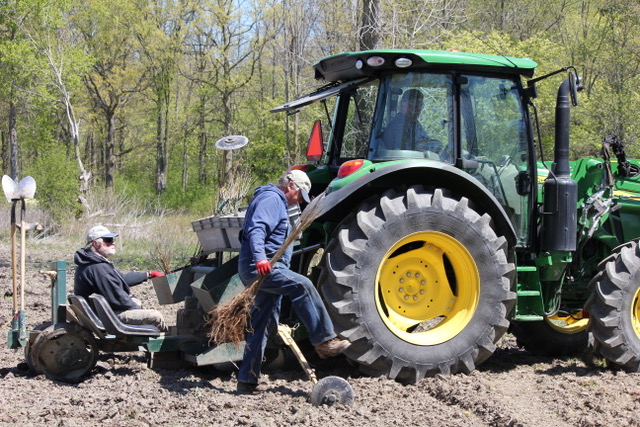
Working quickly and efficiently with a slow moving tractor, Jim Gould and Stu Sharp, planted 6,720 seedling trees at Fairbank Oil Fields this summer. This is in addition to the 6,650 saplings planted last year in the 8-acre former soybean field.
To capture carbon and help mitigate global warming, Fairbank Oil Fields has now planted a whopping 13,370 trees in a former 8-acre soybean field.
The two-year planting program devised by the St. Clair Region Conservation Authority was completed in the summer with a two-day planting blitz.
Put simply, industries convert carbon to carbon dioxide which intensifies the greenhouse effect in the atmosphere. Trees help counter that by removing carbon dioxide through photosynthesis and absorbing it. Emitting oxygen into the air is another benefit of trees.
One acre with a variety of trees species can capture anywhere from 1.1 to 9.5 metric tons of carbon dioxide each year. Using those figures, the tree planting here could be capturing 8.8. to 76 metric tons annually.
Fairbank Oil produces roughly 24,000 barrels of oil each year and the trees will help sequester carbon dioxide it produces. It is known that burning oil – for industry, vehicles, planes etc. – produces more carbon dioxide and nitrous oxide than producing oil will.
The St. Clair Region Conservation Authority chose a very careful mix of trees, planted in a precise way. There are four species of oak, three species of hickory as well as silver maple, sycamore and black walnut. In the past few decades, a number of single species have been hard hit by threats like the emerald ash borer or Dutch elm disease. The diverse mix planted here means the woods will remain healthy, even if hit one tree species is lost to threats.
Unfortunately, the new 8-acre tree planting site is not in a spot where the public can see it. It is north of Aberfeldy Rd. and west of Gypsie Flats. It will serve as a valuable link to the woodlands east and west of it., creating a continuous and larger woodland. This benefits biodiversity, and enhances habitats for birds and wildlife which are under threat from farming and urbanization. With the high cost of farmland, farmers face financial pressures to farm every inch which can lead to removing woodlands.
The tree planting here was largely funded by Natural Resources Canada and non-governmental agencies. Landowners pay roughly one-third of the cost and at Fairbank Oil, the cost was $6,000.
Adding this number of trees out of concern for the environment is just another way Fairbank Oil is trying to be mindful. For more info, go to Technology tab on this website and see Going Green.
